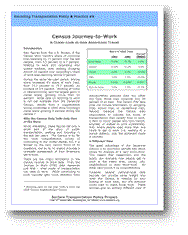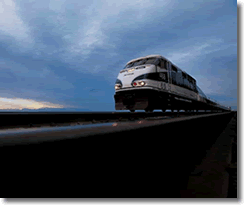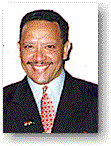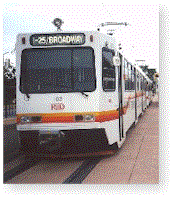|
|
 |
 |
 |
 |
 |
 |
 |
 |
|
|
|
 |
 |
|
June 13, 2002; Volume 8, Issue
11 |
| |
CENSUS DATA
TELLS STORY OF NARROWING
CHOICES  
More Americans Living,
Working in Places With Few Travel
Options |
|
|
 National
Census figures released last week show that
Americans are enduring longer commutes, and fewer
of them are able to use transit, walking, or other
means to avoid the drive. The
average trip to work is up more than three minutes
since 1990 to 25.5 minutes, and a higher portion
of commuters are driving alone to work. National
Census figures released last week show that
Americans are enduring longer commutes, and fewer
of them are able to use transit, walking, or other
means to avoid the drive. The
average trip to work is up more than three minutes
since 1990 to 25.5 minutes, and a higher portion
of commuters are driving alone to work.
“These figures confirm
that travel choices are narrowing for many
Americans when it comes to the work trip,” said
David Burwell, President of the Surface
Transportation Policy Project. “More
people are living and working in places where they
have little choice but to spend a significant part
of their day driving in traffic.”
STPP has created a
variety of materials to help transportation
professionals, journalists, and advocates
interpret the data:
- A new issue of “Decoding Transportation Policy and
Practice” that looks at the limitations of
the Census Journey to Work data and provides
other statistics that give a fuller picture of
travel behavior.
- Easy-to-use, downloadable
Excel documents showing metropolitan area,
county, and place-level transportation Census
data for each state.
- A brief analysis of what the
numbers may mean, including a look at how
housing and work patterns may have influenced
the transportation numbers.
- A news release issued on the
day the national numbers came out.
All
of this information is available at http://www.transact.org/.
|
| |
HILL NEWS
 |
Senate Committee Passes Highway
Funding Bill  |
 |
|
 The
Senate Environment and Public Works Committee
passed legislation on June 4, 2002 resetting
TEA-21’s highway spending baseline to $28.9
billion for FY ’03. This amount represents an
increase of $5.7 billion over the President’s
proposed budget of $23.3 billion, approximately
$4.4 billion below the baseline established with
TEA-21 in 1998. This adjustment was the result of
the Revenue Aligned Budgetary Authority
(RABA) calculations for FY
’03. The
Senate Environment and Public Works Committee
passed legislation on June 4, 2002 resetting
TEA-21’s highway spending baseline to $28.9
billion for FY ’03. This amount represents an
increase of $5.7 billion over the President’s
proposed budget of $23.3 billion, approximately
$4.4 billion below the baseline established with
TEA-21 in 1998. This adjustment was the result of
the Revenue Aligned Budgetary Authority
(RABA) calculations for FY
’03.
|
 |
 |

Senate
Finance Committee to Consider Welfare
Legislation  |
| The
Senate Finance Committee is expected to consider
legislation to reauthorize the Temporary
Assistance for Needy Families (TANF) program in
the coming weeks. Although
no specific proposals concerning transportation
have been introduced to date, several Senators
have recognized transportation as one of the major
barriers blocking TANF recipients from
self-sufficiency.
The
House bill, which passed on May 19, would freeze
funding at $16.5 billion a year in welfare block
grants to the states partly due to the significant
drop in welfare caseloads. House
Members and others opposed to H.R. 4737, the Personal
Responsibility, Work and Family Promotion Act of
2002, have noted that the bill provides no
new resources for work supports despite the
stricter work requirements and the effects
of inflation on the TANF program.
Key
developments in the Senate include a bi-partisan
agreement for a consensus welfare proposal that
endorses greater state accountability, reporting
requirements and increased funding for works
supports, potentially including transportation.
The Senate Finance Committee could mark up welfare
legislation as early as next week, followed by
action on the Senate floor in July or in September
after the August recess. To
learn about opportunities to better link work
promotion, transportation, and housing in the TANF
reauthorization, read the joint letter signed by more than
20 smart growth and transportation
organizations. |
| |
| |
IN OTHER
NEWS
 |
Amtrak Board Approves
Consolidation Plan  |
 |
|
 Amtrak’s new
president David Gunn announced on June 10, 2002
that the organization’s governing board plans to
consolidate authority and to improve efficiency at
the rail carrier. In a message to workers, Gunn
said the changes are part of an effort to
“streamline decision-making and clearly assign
authority and responsibility.” According to an
Amtrak spokesperson, job cuts and management
changes are likely within the next three months.
In addition, the company plans to consolidate its
mail and express business and its three operating
divisions (Intercity, Northeast Corridor, and
Amtrak West) and run all of them out of Amtrak’s
corporate headquarters in Washington,
DC. Amtrak’s new
president David Gunn announced on June 10, 2002
that the organization’s governing board plans to
consolidate authority and to improve efficiency at
the rail carrier. In a message to workers, Gunn
said the changes are part of an effort to
“streamline decision-making and clearly assign
authority and responsibility.” According to an
Amtrak spokesperson, job cuts and management
changes are likely within the next three months.
In addition, the company plans to consolidate its
mail and express business and its three operating
divisions (Intercity, Northeast Corridor, and
Amtrak West) and run all of them out of Amtrak’s
corporate headquarters in Washington,
DC.
Earlier
this month, Gunn cautioned that Amtrak would
likely shut down service in July if the company
was unable to obtain a $200 million loan to cover
budgetary shortfalls.
For
more information, click here. |
 |
 |

Former New Orleans Mayor Marc Morial Joins
STPP Board  |
 |
 Marc Morial, the
Mayor of New Orleans from 1994 to 2002, has joined
STPP’s Board of Directors. Mr. Morial’s
administration was marked by his work to
revitalize neighborhoods and build the local
economy through infrastructure investments.
Additionally, he served as President of the U.S.
Conference of Mayors from 2001-2002, where he led
that organization’s national rail initiative to
advance development of rail travel in the United
States. Mr. Morial is a long-time believer in
STPP’s work, and spoke at the Ten Years of
Progress anniversary dinner in December. He joins
eight current Board members: Sarah
Campbell (chair), David Burwell, Scott Bernstein,
Hank Dittmar, Tom Downs, Judith Espinosa, Kathryn
Higgins, and Jessica Mathews. Marc Morial, the
Mayor of New Orleans from 1994 to 2002, has joined
STPP’s Board of Directors. Mr. Morial’s
administration was marked by his work to
revitalize neighborhoods and build the local
economy through infrastructure investments.
Additionally, he served as President of the U.S.
Conference of Mayors from 2001-2002, where he led
that organization’s national rail initiative to
advance development of rail travel in the United
States. Mr. Morial is a long-time believer in
STPP’s work, and spoke at the Ten Years of
Progress anniversary dinner in December. He joins
eight current Board members: Sarah
Campbell (chair), David Burwell, Scott Bernstein,
Hank Dittmar, Tom Downs, Judith Espinosa, Kathryn
Higgins, and Jessica Mathews.
|
 |
| |
 |
LOCAL REPORT 
 |
| Victory for Transit in
Colorado |
| |
 Denver is likely to
become the next example of a growing trend of
communities choosing to tax themselves to invest
in greater transportation choice and affordability
through transit.
Legislation recently signed into law by
Colorado's Governor Owens gives the Denver
Regional Transportation District standing
authority to put sales tax measures on the
ballot.
RTD is the state’s largest transit agency,
serving Denver’s six-county metro area. Prior to
this legislation, RTD could not go to the ballot
for additional funding for rail and bus projects,
and was the only local region in the state that
didn't have legislative authority to do
so. Denver is likely to
become the next example of a growing trend of
communities choosing to tax themselves to invest
in greater transportation choice and affordability
through transit.
Legislation recently signed into law by
Colorado's Governor Owens gives the Denver
Regional Transportation District standing
authority to put sales tax measures on the
ballot.
RTD is the state’s largest transit agency,
serving Denver’s six-county metro area. Prior to
this legislation, RTD could not go to the ballot
for additional funding for rail and bus projects,
and was the only local region in the state that
didn't have legislative authority to do
so.
 The new law also
created the first-ever dedicated state transit
funding in Colorado by requiring that 10% of the
state sales tax dedicated to transportation be
spent on transit. Colorado
was one of only 5 states that had no dedicated
source of state transit funding. Finally,
the bill enables counties in the RTD area to use
county dollars to provide transit service in
coordination with RTD. The new law also
created the first-ever dedicated state transit
funding in Colorado by requiring that 10% of the
state sales tax dedicated to transportation be
spent on transit. Colorado
was one of only 5 states that had no dedicated
source of state transit funding. Finally,
the bill enables counties in the RTD area to use
county dollars to provide transit service in
coordination with RTD.
Recognizing the importance of
transit to sustained economic prosperity, the
Denver Chamber of Commerce led the effort to pass
the transit bill as part of a package including
additional state highway funds and tolling
authority for CDOT. The effort was spearheaded by
the Denver-based Transit Alliance, which organized
a large, diverse coalition of local governments,
business groups and community groups in support of
the transit bill.
For more details and
the text of the bill, click here.
submitted by Kelly
Nordini |
 |
| |
 |
IN THE MEDIA

 |
 |
Florida Paper Runs Weeklong
Series on Transportation
 Beginning on June
2, 2002, the South Florida Sun-Sentinel ran a
weeklong editorial series on the region’s
transportation crisis called "Crisis: Getting
Nowhere Fast." The series addressed issues of
transit, smart growth, and land-use planning in
the region, and daily articles presented many
different options for the
region. Beginning on June
2, 2002, the South Florida Sun-Sentinel ran a
weeklong editorial series on the region’s
transportation crisis called "Crisis: Getting
Nowhere Fast." The series addressed issues of
transit, smart growth, and land-use planning in
the region, and daily articles presented many
different options for the
region.
To view the series, click
here. |
 |
| |
 |
REPORTS &
RESOURCES 
 |
 |
| TCSP Program Report Released
FHWA recently published
a report highlighting accomplishments and lessons
learned under the Transportation and Community and
System Preservation (TCSP) Program. Click here for more
information.
|
| |

New ‘Bikeability Checklist’
Now Online
 The National Highway
Traffic Safety Administration and the Pedestrian
and Bicycle Information Center at the University
of North Carolina at Chapel Hill released a
“Bikeability Checklist” designed to help people
rate how friendly their communities are for
bicycling, identify problem areas, and find short-
and long-term solutions to improve. The National Highway
Traffic Safety Administration and the Pedestrian
and Bicycle Information Center at the University
of North Carolina at Chapel Hill released a
“Bikeability Checklist” designed to help people
rate how friendly their communities are for
bicycling, identify problem areas, and find short-
and long-term solutions to improve.
For
more information, click here.
|
| |
|

Study Links Auto Use to Neighborhood
Design
For
decades, city planners have dismissed calls for
building better cities, saying there is only
anecdotal evidence that "smart growth" works. But
authors of a new, peer-reviewed study from the
Natural Resources Defense Council say their
research proves for the first time that better
urban design can reduce auto use and relieve the
traffic congestion and pollution that come with
it.
The
researchers' analysis of the San Francisco, Los
Angeles and Chicago metropolitan areas found a
direct link between the amount people drive and
city attributes like neighborhood density, transit
access, and pedestrian- and bicycle-friendliness.
According to the authors, those attributes measure
an area's "location efficiency," and, not
surprisingly, the more efficient the location, the
less people drive. The
study, "Location Efficiency: Neighborhood and
Socio-Economic Characteristics Determine Auto
Ownership and Use - Studies in Chicago, Los
Angeles and San Francisco" by John Holtzclaw,
Robert Clear, Hank Dittmar, David Goldstein and
Peter Haas, appeared in the March 2002 issue of
Transportation Planning and
Technology.
For more information,
click here. |
|
|
CALENDAR 
 |
 |
|
July
31
American Public Transportation
Association
Intermodal Operations Planning
Workshop
July 31 – August 2, 2002
– New York, NY
June
21
MassCentral Rail-Trail "Golden Spike
II"
11am- 2 pm - Bentley College,
Waltham, MA

Congressional Hearing
Schedule
June 13
Senate Committee on Banking,
Housing, & Urban Affairs
Subcommittee
on Housing and Transportation
Hearing
on "TEA-21: A National
Partnership"
10:00
a.m
Dirksen 538
June 18
House Transportation &
Infrastructure Committee
Subcommittee on
Highways and Transit
Hearing on
Intermodalism: Moving America’s People and
Goods
10:00 a.m.
2167 Rayburn House
Office Building
June 20
House Transportation &
Infrastructure Committee
Subcommittee on
Highways and Transit
Hearing on
Federal Transit Capital Grants
Programs
2:00 p.m.
2167 Rayburn
House Office Building
|
| |
| |
| |
| |
| |
| | |
 | |
 |
 |
 |
 |
 |
 |
 |
 |
 |
 |
 |
| |
|